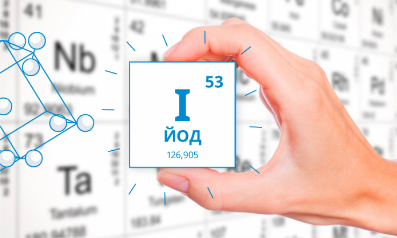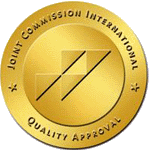THE ROLE OF IODINE IN HUMAN BODY

Iodine - one of the most important microelements, primarily it is necessary for the normal functioning of the thyroid gland, hormones which have a direct impact on the brain and the immune status of the body.
Iodine is involved in the regulation of:
- energy metabolism, body temperature
- biochemical reaction rate
- protein, fat and water-electrolyte metabolism
- metabolism of several vitamins
- growth and development of the body, including neuro-psychological development
Iodine is a component of thyroid hormones (thyroid hormone, thyroid hormones) and is necessary for their synthesis. They provide metabolic levels and influence the conversion of food into energy and the way it is used. Thyroid hormones are significant for the growth and development of all organs. In addition, iodine increases tissue oxygen uptake.
Health problems occur when thyroid hormone levels change either downward (hypothyroidism) or upward (thyrotoxicosis). The reason for the development of these conditions is the long-term iodine deficiency.
The symptoms of thyrotoxicosis are weight loss, palpitations, nervousness, unstable mood, restless sleep, weakness, tremors in the body, sweating.
The opposite effect of abnormal functional activity of the thyroid gland is hypothyroidism. It is more common mainly in iodine deficient regions.
Symptoms of hypothyroidism: weakness, apathy, rapid fatigue, drowsiness, poor memory, shivering, hair loss, brittle nails, constipation, depression, swelling, weight gain.
In severe and chronic iodine deficiency, there is an increase in the size of the thyroid gland.
The main causes of iodine deficiency in the body:
- insufficient intake of the trace element with food
- lack of iodine prophylaxis in iodine deficient regions
- taking medications that impede iodine absorption
- iodine metabolism disorders
- increased background radiation
- environmental pollution
The human body does not synthesize iodine and in order to maintain healthy functioning of the thyroid gland and the whole body, it is necessary to include iodine-rich foods every day and to take periodic medications containing iodine in a prophylactic dose.
Pregnant women should definitely get a daily prophylactic dose of iodine throughout pregnancy. This will help prevent diseases associated with iodine deficiency in the newborn child. During adolescence, the need for iodine increases.
The recommended daily iodine intake for adults is 150 mcg.
During pregnancy and lactation, the rate increases to 175 - 200 mcg.
Food containing iodine:
- marine products - red and brown algae (kelp), halibut, cod, herring, shrimp, sea salt, clams, sardines
- iodized salt
- beef liver, chicken and quail eggs
- persimmons, prunes
- onions, sorrel, cabbage, and carrots (if grown in iodine-rich land)
- small amounts of iodine come with water
In addition to food that supply iodine, there are also those that interfere with the body’s ability to absorb iodine - these are cauliflower, corn.
If you have symptoms similar to those of iodine deficiency, you should visit an endocrinologist and have your hormone levels tested. If there is insufficient iodine, the doctor will prescribe the appropriate treatment if necessary.
Important!
It is not recommended to take iodine without consulting a doctor!
Self-treatment - can cause irreparable harm to the body.




